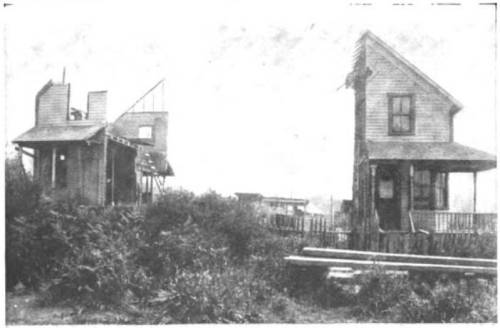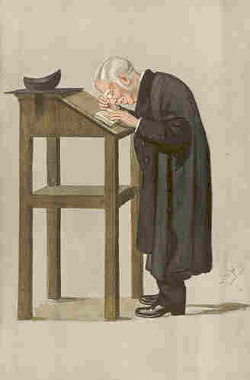quadragesimarian
n. one who observes Lent
A Chess Maze

Harry L. Nelson offered this puzzle in the Journal of Recreational Mathematics in 1983. The black king’s favorite square is c8, but he finds it is under attack by a white pawn. In how few moves can he correct this problem and return to a peaceful c8? White never moves. The black king can capture white pieces, but he may not visit any square more than once and may not enter check.
Imp Perfect
Apparently bored in 1940, Gerald Tyrwhitt-Wilson sent a note to socialite Sibyl Colefax:
I wonder if by any chance you are free to dine tomorrow night? It is only a tiny party for Winston and GBS. I think it important they should get together at this moment. There will be nobody else except for Toscanini and myself. Do please try and forgive this terribly short notice. Eight o’clock and — of course — any old clothes.
“There was only one thing wrong about this heaven-sent epistle, which was written in longhand,” wrote Beverley Nichols. “The address and the signature were totally illegible. The address looked faintly like Berkeley Square, but it might equally have been Belgrave Square and the number might have been anything from 11 to 101. As for the signature she could not tell whether it was male or female.”
Lady Colefax called everyone she knew, but she never found the source. “There is something almost heroic in the thought of her small, thin, determined figure, sitting in her drawing-room in a hail of bombs, reaching out so desperately for the next rung of the social ladder that, for her, reached to heaven.”
Trivium
10102323454577 is the smallest 14-digit prime number that follows the rhyme scheme of a Shakespearean sonnet (ababcdcdefefgg).
(Discovered by Jud McCranie.)
“A Divided Family”

Vito and Giuseppe Bertucci, father and son, living at 3,103, South Twelfth Street, Tacoma, Washington, were equal owners of their house. The son was married. A short time ago the house caught fire and, as a result, became in need of repairs. But here a hitch arose. Father and son could not agree upon just what should be done. They wrangled and wrangled over the matter, and this only led to further misunderstandings, neither would the one buy the other out. There was absolutely no possibility of adjustment of the differences between them, so they did the only wild thing possible — they agreed to each pay their share for the hire of a carpenter who should cut the house in two. The father owns the part on the right of the picture, while the son has already moved his to one side, and will make this the nucleus for another home. The transaction is naturally the laughing affair of Tacoma, and the odd buildings can easily be seen from one of the street cars.
— Strand, November 1906
The Odds
A U.S. serviceman’s chance of death in battle, per Nicholas Hobbes’ Essential Militaria (2003):
- War of Independence: 2 percent (1 in 50)
- War of 1812: 0.8 percent (1 in 127)
- Indian Wars: 0.9 percent (1 in 106)
- Mexican War: 2.2 percent (1 in 45)
- Civil War: 6.7 percent (1 in 15)
- Spanish-American War: 0.1 percent (1 in 798)
- World War I: 1.1 percent (1 in 89)
- World War II: 1.8 percent (1 in 56)
- Korean War: 0.6 percent (1 in 171)
- Vietnam War: 0.5 percent (1 in 185)
- Persian Gulf War: 0.03 percent (1 in 3,162)
Memorable Utterances
William Buckland awoke one night and told his wife, “My dear, I believe that Cheirotherium‘s footsteps are undoubtedly testudinal.” They induced a garden tortoise to walk through a paste of flour, and the impression it left matched the fossil footprint.
On summiting the Finsteraarhorn in 1845, M. Dollfus-Ausset cried, “The soul communes in the infinite with those icy peaks which seem to have their roots in the bowels of eternity!”
In 1919 Cecilia Payne bicycled to the Cambridge Solar Physics Observatory, found a man repairing the roof, and said, “I have come to ask why the Stark effect is not observed in stellar spectra.” He was E.A. Milne, and he didn’t know. “Later he became a good friend and a great inspiration to me.”
Lesson
Teacher: “If you have seven apples and I asked for three, how many would you have left?”
Pupil: “Seven.”
— Ralph Louis Woods, Modern Handbook of Humor, 1967
The Branded Pen
In the early 1980s Doris Lessing published two novels under a pseudonym. “I wanted to highlight that whole dreadful process in book publishing that ‘nothing succeeds like success,'” she told the New York Times. “If the books had come out in my name, they would have sold a lot of copies and reviewers would have said, ‘Oh, Doris Lessing, how wonderful.'”
It appears her concerns were justified. Diary of a Good Neighbor was rejected by Lessing’s regular U.K. publisher as “not commercially viable”; another house said it was “too depressing to publish.” When it did appear and no one recognized her work, she wrote a second novel, If the Old Could, under the same pseudonym. Each book received promotion typical for a novel by an unknown author, garnered few reviews, and sold only a few thousand copies.
“Some of the so-called experts on my work, people who I know looked at the novels by Jane Somers, didn’t recognize it was me,” Lessing said. “And many of the readers’ reports to the publishers were very patronizing and very nasty. … What happens mostly is that an immense amount of space will be given to not very good books by established writers.”
Metathesis

William Archibald Spooner never (or rarely) uttered the verbal train wrecks that were attributed to him (“Which of us has not felt in his heart a half-warmed fish?”). But he seemed strangely prone to similar gaffes in daily life:
- He told a student, “I thought you read the lesson badly today.” When the student protested that he hadn’t read it, “Ah,” said Spooner, “I thought you didn’t.”
- He told a fellow don at Oxford, “Do come to dinner tonight to meet our new fellow, Casson.” When the man explained, “But, warden, I am Casson,” Spooner returned, “Never mind, come all the same.”
- To another student: “Let me see. Was it your or your brother that was killed in the war?”
- An Oxford colleague once received a note asking him to come to Spooner’s office the following morning. At the bottom was a postscript saying that the matter had been resolved and that he needn’t come.
- A dining companion once saw Spooner spill a small amount of salt on the table. Apparently reversing the technique for removing a stain, he poured wine on it.
Professor Edward Morris Hugh-Jones recounted a dinner in North Oxford: “It came on to rain quite heavily, and [Spooner’s] host and hostess pressed him to stay. It was far too cold and wet for Spooner to traipse all the way back to college, they said, and they would gladly make up a bed for him. They were as good as their word and briefly departed upstairs to see to the arrangements. When they came down again, their guest had disappeared. Suddenly there was a knock at the house door, and there was Spooner, totally wet through, with a little bundle in his hands. ‘My nightshirt,’ he explained. ‘I went back to college for it.'”

